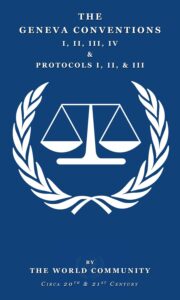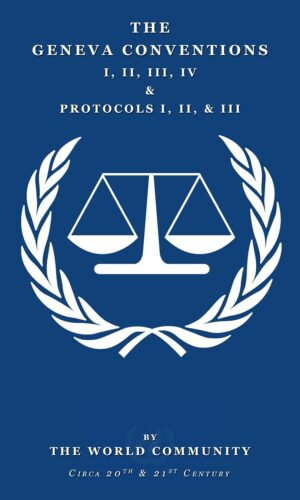
Given the historical proclivities of human beings, it is overwhelmingly likely, if not inevitable, that wars between different groups, usually nations, will occur. In an effort to ensure that, when this happens, the lives of innocent civilians are protected, international laws have been developed that define what actions, even in the pursuit of war, are considered criminal. These apply both to international war, i.e, between nations, and to internal conflicts, i.e. not between different nations, including the Hamas attack on civilians in Israel as well as Israel’s response, and of course to the actions of any nation or group that engages in war, declared or undeclared, including the United States. I have listed only what appear to be the relevant crimes that may apply to either one or both sides in current conflicts.
As an American, and a citizen of a country that, in its founding documents and subsequent pronouncements, including its endorsement and ratification of the 1949 Geneva Conventions Relative to the Protection of Civilian Persons in Time of War, has championed humanitarian values, I do not support my own government engaging in any of the following war crimes. I also do not approve of my government providing material or diplomatic support to any other nation or group that engages in such war crimes.
War Crimes as defined by the United Nations Office on Genocide Prevention and Responsibility to Protect. ( https://www.un.org/en/genocideprevention/war-crimes.shtml ) and as listed in the 1949 Geneva Conventions Relative to the Protection of Civilian Persons in Time of War.
The 1949 Geneva Conventions have been ratified by all Member States of the United Nations, while the Additional Protocols and other international humanitarian law treaties have not yet reached the same level of acceptance. However, many of the rules contained in these treaties have been considered as part of customary law and, as such, are binding on all States (and other parties to the conflict), whether or not States have ratified the treaties themselves.
War crimes contain two main elements:
- A contextual element: “the conduct took place in the context of and was associated with an international/non-international armed conflict”;
- A mental element: intent and knowledge both with regards to the individual act and the contextual element.
Relevant War Crimes:
- Grave breaches of the Geneva Conventions of 12 August 1949, namely, any of the following acts against persons or property protected under the provisions of the relevant Geneva Convention:
- Wilful killing (intentionally killing one or more people who were supposed to be protected the Geneva Conventions. The person who did the killing knew that they were breaking these rules and the killing happened during a war that involved more than one country).
- Wilfully causing great suffering, or serious injury to body or health;
- Extensive destruction and appropriation of property, not justified by military necessity and carried out unlawfully and wantonly;
- Unlawful deportation or transfer or unlawful confinement;
- Taking of hostages.
2. Other serious violations of the laws and customs applicable in international armed conflict, within the established framework of international law, namely, any of the following acts:
- Intentionally directing attacks against the civilian population as such or against individual civilians not taking direct part in hostilities;
- Intentionally directing attacks against civilian objects, that is, objects which are not military objectives;
- Intentionally directing attacks against personnel, installations, material, units or vehicles involved in a humanitarian assistance or peacekeeping mission in accordance with the Charter of the United Nations, as long as they are entitled to the protection given to civilians or civilian objects under the international law of armed conflict;
- Intentionally launching an attack in the knowledge that such attack will cause incidental loss of life or injury to civilians or damage to civilian objects or widespread, long-term and severe damage to the natural environment which would be clearly excessive in relation to the concrete and direct overall military advantage anticipated;
- Attacking or bombarding, by whatever means, towns, villages, dwellings or buildings which are undefended and which are not military objectives;
- Intentionally directing attacks against buildings dedicated to religion, education, art, science or charitable purposes, historic monuments, hospitals and places where the sick and wounded are collected, provided they are not military objectives;
- The transfer, directly or indirectly, by the Occupying Power of parts of its own civilian population into the territory it occupies, or the deportation or transfer of all or parts of the population of the occupied territory within or outside this territory;
- Utilizing the presence of a civilian or other protected person to render certain points, areas or military forces immune from military operations;
- Killing or wounding treacherously individuals belonging to the hostile nation or army;
- Committing outrages upon personal dignity, in particular humiliating and degrading treatment;
- Declaring that no quarter will be given;
- Intentionally using starvation of civilians as a method of warfare by depriving them of objects indispensable to their survival, including wilfully impeding relief supplies as provided for under the Geneva Conventions
Subscribe to Casey Dorman’s Newsletter. Click HERE





